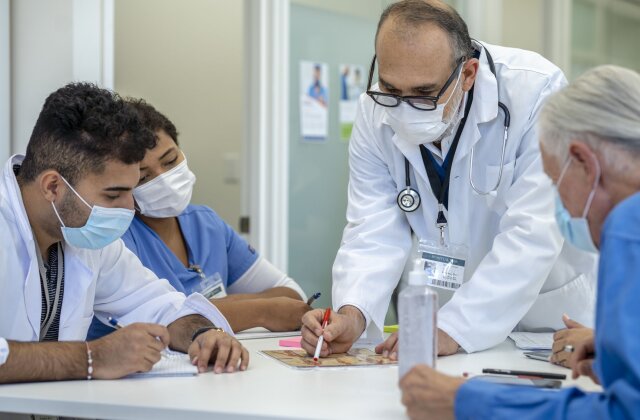
Embarking on the journey towards a career in medicine is a path filled with challenges and milestones, one of the most pivotal being the medical school interview. It’s a defining moment where attitude and preparation converge, demanding more than just academic prowess. Medical school interview preparation is not just about impressing the panel; it’s about showcasing your passion, empathy, and the unique qualities that make you an ideal candidate for the medical school. This preparation phase is an artful blend of self-reflection, strategic planning, and honing communication skills.
As future physicians, candidates must navigate various interview formats – from the traditional one-on-one dialogues to the dynamic Multiple Mini Interviews (MMI) and the intricate nuances of the modified personal interview (MPI) and other hybrid interviews. Each format tests different facets of a candidate’s personality and suitability for medicine. The key to acing these interviews lies not only in understanding these diverse formats but also in mastering the art of articulation and ethical reasoning, all while staying abreast of current medical debates and policies.
In this comprehensive guide, we unravel the secrets to navigating this crucial medical school interview prep phase with confidence and poise, helping you step closer to donning that coveted white coat.
1. Understanding Medical School Interview Formats and Expectations
Traditional, MMI, MPI, and Hybrid Interviews
A crucial aspect of medical school interview preparation involves understanding the various formats of interviews that medical schools utilize. Each format assesses different competencies and skills, shaping the way candidates should approach their preparation.
Traditional interviews, often the cornerstone of the medical school interview process, are typically one-on-one or involve a panel. In these interviews, the focus is on the applicant’s personal experiences, motivations for pursuing a career in medicine, and understanding of the medical profession. The traditional format allows for a more in-depth exploration of the candidate’s academic achievements, extracurricular activities, and personal attributes. It’s a conversational platform where candidates can showcase their communication skills, maturity, and suitability for the demanding field of medicine.
Multiple Mini Interviews (MMI)on the other hand, offer a unique challenge. They consist of a series of short, structured stations where candidates are presented with scenarios or tasks to demonstrate their problem-solving ability, ethical reasoning, and interpersonal skills. MMIs are designed to assess qualities like empathy, critical thinking, and adaptability. This format requires robust medical school interview preparation, since they are unlike any traditional job interviews as candidates must be ready to think on their feet and express their thoughts coherently under time constraints.
Modified Personal Interviews (MPI) are a relatively new addition, focusing on a more holistic assessment of the candidate. They usually involve several short interviews, each with a different interviewer, enabling a diverse evaluation of the candidate from multiple perspectives. MPIs often blend elements of traditional interviews with the dynamic nature of MMIs, emphasizing both personal attributes and situational responses.The University of Toronto used to use the MPI format but has transitioned to a virtual MPI format (vMPI) that more closely resembles a pre-recorded MMI.
Hybrid Interviews are exactly as they sound – a combination of different formats. These interviews might start with a traditional segment, followed by MMI stations, offering a comprehensive assessment platform. Hybrid formats require versatile preparation, as candidates need to be adept in both long-form conversation and rapid situational responses.
Open vs Closed File Interviews
When diving into medical school interview preparation, understanding the distinction between open and closed file interviews is paramount. In Open File Interviews, interviewers often have access to the applicant’s complete application, including academic records, personal statements, and letters of recommendation. This format allows interviewers to ask specific, detailed questions based on the candidate’s experiences and achievements. Candidates should be thoroughly familiar with their application materials and ready to discuss any aspect in depth.
Conversely, Closed File Interviews provide a different challenge. Here, interviewers have little to no information about the candidate’s background or achievements. The questions are more general and aimed at gauging the candidate’s personality, ethical viewpoints, and critical thinking skills, rather than specific academic or extracurricular accomplishments. This format tests the candidate’s ability to articulate their motivations and competencies effectively, without relying on their resume.
For effective med school interview prep, candidates should tailor their strategies according to the interview format they will encounter. Understanding the nuances of each format is crucial – it dictates the way candidates present their experiences, respond to questions, and engage with interviewers.
2. Early and Effective Preparation Strategies for your Medical School Interview
Reflecting on Personal Experiences
The foundation of a compelling interview is built on the rich tapestry of one’s personal experiences. As part of your medical school interview preparation, it’s vital to introspect and catalogue significant events and milestones in your journey. These could range from academic accomplishments to personal challenges and triumphs. The objective is to create a narrative that not only showcases your achievements but also reflects your resilience, adaptability, and growth.
When you reflect, consider instances where you demonstrated leadership, empathy, or overcame adversity. Think about situations where you had to make tough decisions or instances where you learned valuable life lessons. This reflection isn’t just about rehearsing answers but about understanding the depth of your experiences and how they have shaped your aspiration to become a doctor. These personal anecdotes will be instrumental in painting a vivid and authentic picture of who you are during the interview.
Your experiences can then be integrated into most questions. Even ethical scenario questions, such as ones dealing with themes such as reporting colleagues, standing up to a superior, etc. can have personal experiences integrated into them by reflecting on how your experience is similar to the scenario mentioned. This will help personalize all your responses and make you stand out from the other premed crowd.
Familiarizing with Common Interview Questions
Another key aspect of medical school interview Preparation is to acquaint yourself with the spectrum of questions that you might encounter. This preparation goes beyond the clinical aspects of medicine, encompassing ethical dilemmas, situational judgments, and personal introspection. These questions are designed to gauge not just your knowledge but your character, critical thinking, and suitability for a career in medicine.
To prepare effectively, engage with a variety of question types, from ‘why medicine?’ to scenario-based ethical questions. Understand that each question is an opportunity to demonstrate your analytical skills, your empathetic nature, and your commitment to the field. However, avoid rote learning responses. Instead, focus on understanding the intent behind each question and craft responses that are genuine and reflective of your own beliefs and experiences. This approach will help you in articulating well-thought-out and authentic responses that resonate with the interview panel.
Here is a list of questions from our database that you should look into: https://acceptedtogether.com/interviewquestions
Practicing with Mock Interviews
Arguably the most critical component of medical school interview preparation is participating in mock interviews. These simulations provide a realistic environment to practice and hone your interview skills. During these sessions, focus on not just the content of your answers but also on your delivery, body language, and ability to handle stress.
Mock interviews with peers or admissions consultants can help identify areas of improvement, whether it’s in articulating your thoughts more clearly, managing interview anxiety, or refining your responses to be more concise and impactful. They also familiarize you with the dynamics of a real interview, helping to reduce surprises and increase your confidence. Remember, the key is not just about answering questions correctly, but about communicating effectively, showing genuine interest, and presenting yourself as a capable and passionate candidate for the medical profession.
If you prefer to not practice with peers/admissions consultants, you can still get a lot of mock interview practice by recording yourself. Although it is very awkward for most, it does wonders in terms of med school interview prep!
3. Enhancing Communication Skills for Medical School Interview Preparation
The art of communication plays a pivotal role in the realm of medical school interview preparation. As a prospective medical student, your ability to convey thoughts, empathize, and engage with interviewers is as crucial as your academic credentials. This segment of your preparation journey focuses on enhancing these vital communication skills, with a focus on avoiding memorized responses, adopting a conversational tone, and managing nervousness to project confidence.
Avoiding Memorized Responses
In the context of med school interview prep, one common pitfall is relying heavily on memorized responses. While it’s beneficial to be prepared, scripted answers can come across as inauthentic and detached. Interviewers are adept at discerning whether a response is rehearsed or spontaneous. They seek genuine interaction, not a recitation. Even if your answers are recorded, it is vital to make sure you don’t sound like you memorized the response.
The key is to prepare for questions by understanding the core themes and reflecting on your experiences, but leave room for natural and spontaneous articulation. This approach allows for a more authentic exchange, showcasing your genuine interest and personality. Remember, the interview is an opportunity to demonstrate how you think and react in real-time, not just your ability to remember and recite.
Adopting a Conversational Tone
Another critical aspect of effective communication in medical school interview preparation is adopting a conversational tone. This means engaging with the interviewer in a manner that is both professional and personable. A conversational tone helps in establishing a connection and makes the interaction more engaging and memorable.Even if the answers are recorded, still try to make it sound like answering a question in a conversation rather than “lecturing” the camera!
To master this, practice speaking about complex topics in a manner that is easy to understand and relatable. Avoid using overly technical language or professional jargon that can alienate the listener. Instead, focus on clear, concise communication that conveys your points effectively. Think of the interview as a two-way dialogue rather than a monologue, and aim to make your responses interactive and engaging.

Managing Nervousness and Projecting Confidence
Nervousness is a natural part of any interview process, particularly in the high-stakes scenario of medical school interview preparation. However, managing this nervousness and projecting confidence are skills that can be honed with practice. Confidence in an interview setting doesn’t mean arrogance; rather, it’s about being comfortable in your skin and expressing your thoughts clearly.
Start by practicing deep breathing or mindfulness techniques to calm your nerves before the interview. During the interview, maintain good posture, make regular eye contact, and be mindful of your body language. Remember that it’s okay to take a moment to gather your thoughts before responding to a question. This not only helps in delivering a well-thought-out answer but also demonstrates your composure under pressure.
4. Ethical Considerations and Current Medical Issues in Medical School Interview Preparation
Ethical discernment and staying on top of contemporary medical debates are fundamental medical school interview tips. As aspiring physicians, your ability to navigate the complex ethical landscape and engage in informed discussions about current medical policies is crucial. This segment of your preparation journey is dedicated to understanding basic medical ethics and remaining updated on current medical debates and policies.
Understanding Basic Medical Ethics
Ethical considerations in medicine are not just academic concepts; they are practical guidelines that will govern your decisions and actions as a healthcare professional. The principles of beneficence (doing good), non-maleficence (doing no harm), justice (fairness in treatment), and patient autonomy (respecting patients’ rights to make their own decisions) form the cornerstone of ethical medical practice.
Understanding these principles is imperative for medical school interviews. For example, you may be presented with a situation involving patient confidentiality or end-of-life care decisions, requiring you to apply these ethical principles in your response. Preparing for these questions involves more than just learning the principles; it involves developing the ability to apply them to real-world scenarios thoughtfully and empathically.
A good starting point is to read up on ethical dilemmas faced in healthcare and consider how you would handle such situations. Reflect on the potential conflicts between these ethical principles and how you would prioritize them in different contexts. This reflective practice not only prepares you for interviews but also lays a strong foundation for your future medical career.
Staying Informed on Current Medical Debates and Policies
An equally important medical school interview tip is keeping yourself well-informed about current medical debates and policies. Medical schools are looking for candidates who are not only academically competent but also engaged and aware of the issues facing the medical community today.
This preparation involves staying updated on a range of topics, from public health policies to ethical debates surrounding emerging medical technologies. Issues like the legalization of medical marijuana, healthcare accessibility, vaccination policies, and the ethics of genetic editing are all relevant topics that might come up during your interview. Staying informed about these issues demonstrates your commitment to the field of medicine and your readiness to engage in the broader conversation as a medical professional.
To prepare, regularly follow healthcare news and debates (we are going to list some sources further down). This continuous engagement will help you develop a nuanced understanding of these topics, enabling you to articulate informed opinions during your interviews. Remember, your goal is not to simply echo the dominant viewpoint but to showcase your ability to think critically and engage with complex issues in a thoughtful manner.
Healthcare news/healthcare debates sources:
- https://healthydebate.ca/
- https://www.mhaonline.com/blog/debates
- https://www.pbs.org/healthcarecrisis/tough_questn.htm
5. Preparing for the Interview Day
In the journey of med school interview prep, the day of the interview is a critical milestone. It’s not just about what you say; it’s also about how you present yourself and interact with others. This phase of preparation focuses on logistics and punctuality, adhering to a professional dress code, and engaging effectively with interviewers and staff.
Logistics and Punctuality
Aim to arrive at the interview location early (even the day before, if possible). This gives you the opportunity to familiarize yourself with the environment, locate the interview venue, and mitigate any unforeseen travel issues. Remember, arriving early reduces stress and allows you to mentally prepare in a calm and composed manner.
Being punctual is not just about respecting the interview schedule; it reflects your commitment and professionalism. It also gives you time to relax, gather your thoughts, and mentally transition into interview mode.
Dress Code and Professional Etiquette
Dressing appropriately is an obvious medical school interview tips but you would be surprised how many people forget it. The dress code for medical school interviews is typically business professional. Men should consider wearing a suit and tie, while women can opt for a business suit or a conservative dress. The key is to dress in a way that is professionally appropriate and comfortable.
Remember, the way you dress sends a message about your seriousness and respect for the occasion. Avoid overly flashy attire; instead, opt for colors and styles that are professional and subdued. A well-groomed appearance goes a long way in making a positive first impression.
Additionally, professional etiquette extends beyond clothing. It encompasses your entire demeanor – from the firmness of your handshake to your posture and eye contact. A confident, yet not overbearing, demeanor can set a positive tone for the interview.
Engaging with Interviewers and Staff
Remember that every interaction, from the moment you step onto the campus, counts. Be courteous and professional to everyone you meet, including administrative staff and fellow candidates.
During the interview, engage with your interviewers in a manner that is respectful, attentive, and shows genuine interest. Listen carefully to the questions asked and respond thoughtfully. It’s perfectly acceptable to ask for clarification if you’re unsure about a question. This not only shows your willingness to understand the question fully but also your attention to detail.
Moreover, engaging with interviewers means being able to read the room. If the interviewer is more formal, match their tone. If the interviewer engages in light conversation, feel free to reciprocate while remaining professional.
Virtual Interview Special Considerations
Technical Setup and Environment
The first step in preparing for a virtual interview in the medical school interview preparation process is to establish a suitable technical setup. Test your equipment prior to the interview day to avoid any technical glitches. Setting up the right environment is equally important. Choose a quiet, well-lit space where you won’t be disturbed. The background should be neutral and professional – think of it as creating a mini ‘interview studio’ in your home. If you’re using a laptop or tablet, place it in a position where the camera is at eye level. This setup helps maintain a natural eye line, akin to a face-to-face conversation.
Lighting plays a significant role in how you are perceived on camera. Natural light is best, but if that’s not possible, make sure the room is well-lit with no shadows casting across your face. Avoid backlighting, as it can make your face appear dark and uninviting.
On-Camera Communication Nuances
Mastering the art of on-camera communication is a vital part of medical school interview Preparation for virtual interviews. Unlike in-person interviews, virtual interviews require you to focus on the camera to maintain eye contact. This can feel unnatural at first, but practicing speaking to the camera as if you’re speaking to a person will make your responses more engaging and personal.
Be mindful of your body language. Even though you’re not in the same room as the interviewers, your gestures, posture, and facial expressions are still being evaluated. Sit up straight, avoid fidgeting, and use hand gestures naturally to emphasize points.
Another key aspect is managing your vocal tone and pace. Nerves can cause you to speak quickly or in a monotone. Practice speaking clearly and at a moderate pace to ensure your responses are understood. Since the camera can sometimes flatten affect, you may need to be slightly more expressive than usual to convey enthusiasm and engagement.
A unique challenge of virtual interviews (which are often recorded) is the absence of physical cues from the interviewer. Without these cues, gauging reactions or knowing when to wrap up an answer can be difficult. Practice concise answers to common interview questions, and be prepared to adapt based on the feedback you receive, whether verbal or through the interviewer’s body language.
Conclusion
In summary, medical school interview preparation is a multifaceted process that demands thorough and strategic planning. From understanding various interview formats to mastering the nuances of virtual interviews, each aspect plays a pivotal role in shaping a candidate’s success.
FAQ
1. What are the different types of medical school interviews I might encounter?
Medical school interviews can vary in format, including Panel/Traditional Interviews, Multiple Mini Interviews (MMI), Modified Personal Interviews (MPI), and Hybrid Interviews. Each format assesses a candidate’s suitability for the medical profession differently, focusing on interpersonal skills, ethical decision-making, problem-solving abilities, and personal experiences.
2. How should I prepare for a medical school interview?
Effective preparation for a medical school interview involves early planning, thorough reflection on personal experiences, and familiarization with common interview questions. Practicing mock interviews, improving communication skills, and understanding ethical principles in medicine are also crucial. Additionally, staying informed about current medical debates and policies will enhance your readiness.Read the full articles for all the important details regarding effective preparation!
3.What is the significance of knowing my interview format in advance?
Knowing the format of your medical school interview in advance is crucial as it shapes your preparation strategy. Different formats require different preparation approaches. For instance, MMI interviews focus on scenario-based questions and ethical dilemmas, while traditional interviews may delve more into your personal motivations and experiences in medicine.
4. How important are communication skills in medical school interviews?
Communication skills are fundamental in medical school interviews. Candidates should avoid memorized responses and adopt a conversational tone to effectively engage the interviewer. Managing nervousness and projecting confidence are also vital, as these skills reflect your potential as a future medical professional.
5. What ethical considerations should I be aware of for medical school interviews?
Candidates should be familiar with basic medical ethics, including principles like beneficence, non-maleficence, justice, and patient autonomy. Understanding these ethical principles and how to apply them in real-life scenarios demonstrates your readiness to handle the moral complexities of the medical profession.
6. Are there special considerations for virtual medical school interviews?
Yes, virtual interviews require specific considerations such as ensuring a stable technical setup and a quiet, well-lit environment. On-camera communication also has its nuances, including maintaining eye contact with the camera and being mindful of your body language to convey confidence and engagement effectively.
7. What role does professionalism play on the day of the interview?
Professionalism is key on the day of the interview. This includes punctuality, dressing appropriately, and engaging respectfully with everyone you meet. Demonstrating professional etiquette throughout the interview process is crucial as it reflects your readiness to be part of the medical community.







